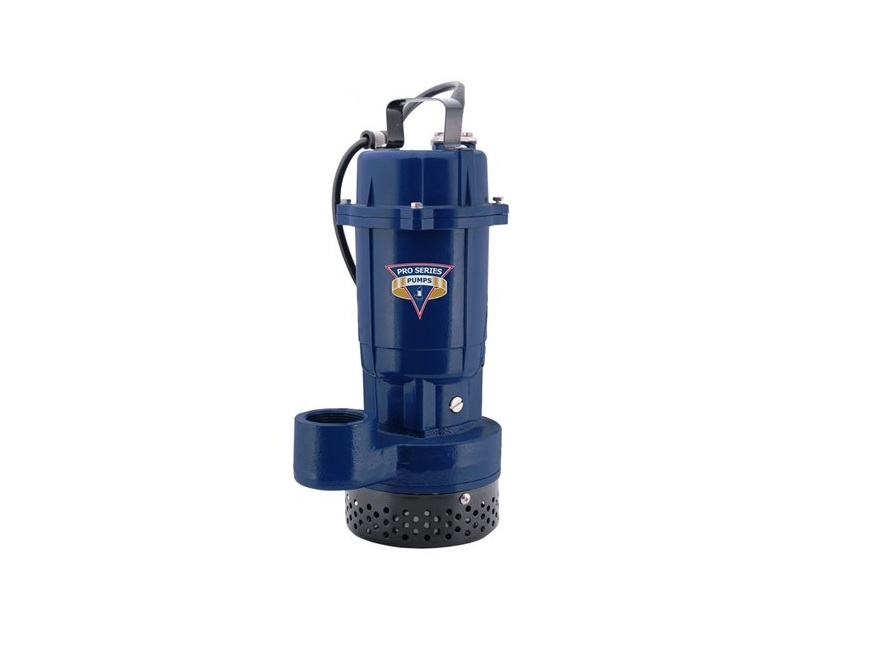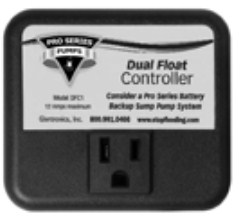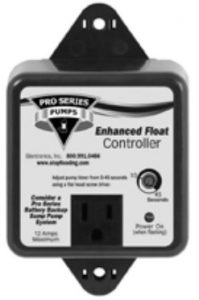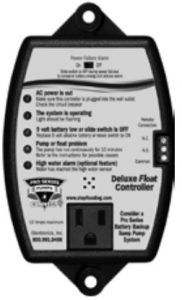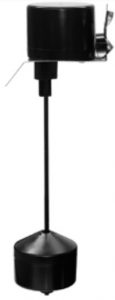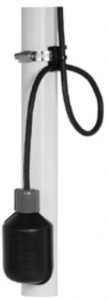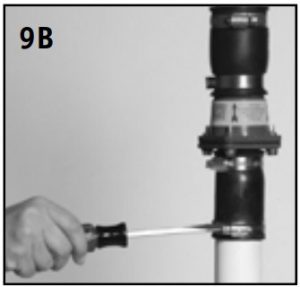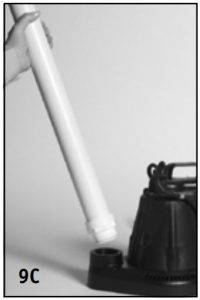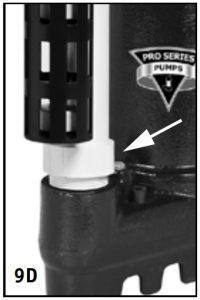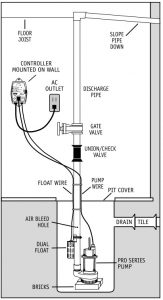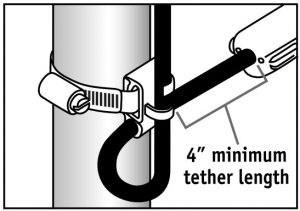ST1033 & ST1050 Sump Pumps Instruction Manual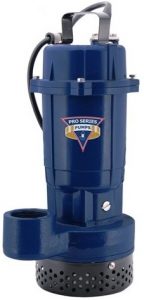
Important Safety Instructions
SAVE THESE INSTRUCTIONS. This manual contains important SAFETY WARNINGS and OPERATING INSTRUCTIONS. You will need to refer to it before attempting any installation or maintenance. ALWAYS keep these instructions with the unit so that they will be easily accessible.Failure to read and follow these warnings and instructions could result in property damage, serious injury, or death.
WARNINGRisk of electric shock. To reduce this risk, observe the following precautions.
- ALWAYS disconnect the pump and float switch controller from the power source before servicing or making adjustments.
- NEVER handle the pump or motor with wet hands or when standing on a wet or damp surface while the pump is plugged into the power source.
- MAKE SURE THERE IS A PROPERLY GROUNDED RECEPTACLE AVAILABLE. This pump is wired with a 3-prong grounded plug. To reduce the risk of electric shock, be certain that it is only connected to a properly grounded, 3-prong receptacle. If you have a 2-prong receptacle, have a licensed electrician replace it with a 3-prong receptacle according to local codes and ordinances.
- NEVER bypass grounding wires or remove the ground prong from the plug.
- DO NOT use an extension cord. The electrical outlet should be within the length of the pump’s power cord, and at least 4 feet above the floor level to minimize potential hazards from flood conditions.
- DO protect the electrical cord from sharp objects, hot surfaces, oil, and chemicals. Avoid kinking the cord.
- MAKE SURE the supply circuit has a dedicated fuse or circuit breaker rated to handle the power requirements noted on the nameplate of the pump.CAUTION To reduce the risk of hazards that can cause injury or property damage, observe the following precautions.
- DO NOT use the power cord or strain relief to carry the pump. Use the pump handle.
- DO NOT pull on the float switch cord.
- DO NOT expose the control unit to any type of moisture, water, rain or snow.
- DO NOT place the controller on the floor. The electrical outlet should be within the length of the pump’s power cord and at least 4 ft above the floor.
- DO NOT operate this product if it has been damaged in any way.
- DO NOT use sump pumps in pits handling raw sewage, salt water, or hazardous liquids. This pump is for ground water only.
- DO NOT disassemble this product. When service is required, contact Glentronics technical support at 800-991-0466. Return the product to the manufacturer for any repairs at the following address:Glentronics, Inc., 645 Heathrow Drive, Lincolnshire, IL 60069
- When installing or replacing a primary sump pump you should also install a battery backup sump pump system.
| Specifications | 1/3 HP Model ST1033 | 1/2 HP Model ST1050 |
| GPH @ 0’ | 4100 | 5300 |
| GPH @ 10’ | 2770 | 4320 |
| Pump diamete | 7.375” | 9.75” |
| Volts | 115V, 60Hz | 115V, 60Hz |
| Amps | 3.8 | 4.8 |
Items Included
- Pump
- Choice of controller, float
- Stainless steel hose clamp 2″ x 1-1/2″ reducer adapter (on 1/2 HP pump only)
Note: The 1/2 HP pump will accommodate a 2″ discharge pipe. However, most homes have 1-1/2″ pipes. Therefore we have included a 2″ x 1-1/2″ reducer adapter with this pump. You may replace your 1-1/2″ discharge pipe with a 2″ discharge pipe, and a 2″ adapter to obtain the optimum gallons per hour.
You may also need:1-1/2” rigid PVC pipe to connect to the existing plumbingA check valve or union PVC pipe cleaner and cement.
- Dual Float Controller

- Enhanced Controller

- Deluxe Controller

- Dual Float Switch

- Vertical Float Switch

- Tether Float Switch

NOTICES
- When a check valve is used, a 3/16” (4.7 mm) air bleed hole must be drilled in the PVC pipe above the pump. Drill the hole at a 45º angle toward the bottom of the sump to avoid splashing water outside the sump pit. Make sure the hole is above the water line, and below the check valve. If a hole is not drilled above the pump, an air lock may prevent the pump from operating.
- The control unit must receive 115V AC +/- 5% and 60 Hz from the AC outlet.
- Primary pumps will not provide protection during a power outage. With the risk of property damage from high water levels, the addition of a Pro Series battery backup sump pump system is highly recommended.
- After the initial installation, be sure to check the operation by filling the sump with water and observing the pump operation through several full cycles.
- For continuous duty operation, the pump must be submerged at least 3/4 of the depth of the pump at all times. Do Not use the float switch and controller within this application.
- In instances where the discharge line is exposed to freezing temperatures, the pipe must be sloped downward so any remaining water will drain out. Failure to do so will prevent water from exiting the sump and damage the pump if the line freezes.
Installation Instructions
Prior to Installation
- Visually inspect your pump. Products may be damaged during shipping. If the product has been damaged, contact your place of purchase or Glentronics, Inc. before installation.
- Thoroughly read the instructions provided to learn specific details regarding installation and use. This manual should be retained for future reference.WARNING This installation must be in accordance with the National Electric Code and all applicable local codes and ordinances.
Installing the Pump
- Use a pit that conforms to all local codes and is large enough to accommodate the pump and float switch. Larger sump pits are preferred, since they will extend the discharge cycle and reduce the number of times the pump turns on.
- Clean the pit of all debris. The pump’s strainer must be kept clear.
- The pump should not be set directly onto a clay, earthen, or sand base. Install bricks or blocks under the pump to provide a solid base.
- The pump should be level.
- Install discharge plumbing according to local, regional and state codes. Rigid PVC pipe is recommended.
- An in-line check valve is recommended to prevent back-flow. This check valve is mandatory when sharing a discharge line with another pump (i.e. a back-up pump or a second primary pump). (a) When a check valve is used, a 3/16” (4.7 mm) air bleed hole must be drilled in the PVC pipe above the pump. Drill the hole at a 45º angle toward the bottom of the sump to avoid splashing water outside the sump pit. Make sure the hole is above the water line, and below the check valve. If a hole is not drilled above the pump, an air lock may prevent the pump from operating.
- Install a gate valve or ball valve if required by any codes.
- The horizontal discharge pipe must be positioned in a downward slope so any remaining water will drain away.Failure to do this will prevent water from exiting the pit and damage the pump if the line freezes.
- If you are replacing an old sump pump:
- (a) Unplug the pump from the outlet.
- (b) Loosen the check valve or rubber union by unscrewing the bottom hose clamp. (If the existing system is installed without a check valve or rubber union, saw the pipe apart above the sump pit.)

- (c) Remove the old pump and unscrew the pipe and adapter.

- (d) If the adapter fits into the new pump, screw the pipe into the pump. If not, cut a piece of rigid PVC pipe and connect it to the new adapter by cleaning and cementing the two pieces together. (Follow the instructions on the PVC cleaner and cement.)

- (e) Lower the pump into the sump by the handle.
- (f) Connect the pipe on the pump to the existing discharge pipe with a rubber union or check valve and tighten the hose clamps securely.
- A pit cover is recommended for all installations as a safety measure and to helpprevent debris from falling into the pit. Be sure protect the cords from damage when installing a pit cover.

Installing the Dual Float Switch
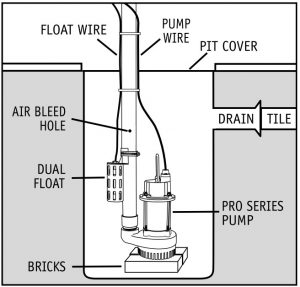
The Pro Series Dual Float Switch is easy to install by using the enclosed metal hose clamp.
- Hold the float switch to the discharge pipe so the cage is below the bracket.
- Secure the float to the pipe with the enclosed hose clamp, but do not completely tighten the clamp at this time.
- Position the float switch to a level where thebottom of the float cage is no lower than 50% of the maximum height of the pump. To avoid debris pouring into the float, it should be positioned on the side of the discharge pipe opposite the drain tile.Note: It is important to mount the float below the drain tile that empties into the pit.Mounting it above the drain tile would allow water to fill the drain tile before the pump is activated to pump out the water.
- Once the float switch is in the desired position, tighten the clamp
Installing the Vertical Float Switch
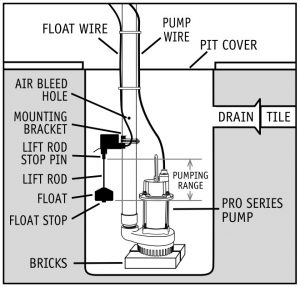
The vertical float switch contains a single large float.Water will lift the float to the top of the lift rod which will raise the lift rod and activate the pump. As the pump evacuates the water from the pit the float will drop, lowering the lift rod and turning off the pump.Note: The vertical float switch must be moving freely at all times. Make sure the float switch does not come into contact with other pumps, wires, pipe or any other object that may be in the sump pit. The float switch must not come into contact with the sump pit floor or wall. If the float switch does not move freely the pump will not activate.
- . Fully open the metal hose clamp and insert it through the slots in the mounting bracket of the float switch.
- Place the hose clamp over the discharge pipe so that the gripping tabs are against the pipe and select the desired activation level of the pump.
- (a) When using the vertical float switch with either the Enhanced or Deluxe Controller (Models VSC1.5 or VSC2), there are two rubber stoppers on the float switch rod. Do not remove or alter their position as it will disrupt the timing of the controller and how long the pump runs. (b) When using the vertical float switch without a controller (Model VS), the pumping range can be adjusted by moving the float stop up or down the lift rod. Note: It is important to mount the float so that the activation level is below the drain tile that empties into the pit. Mounting it above the drain tile would allow water to fill the drain tile before the pump is activated to pump out the water.
- To avoid debris from pouring onto the float, it should be positioned on the side of the discharge pipe opposite the drain tile.
- Once the float switch is in the desired position, securely tighten the hose clamp.Note: The cable from the switch must remain outside the hose clamp.
Installing the Tether Float Switch
The tether float contains a single float connected to a flexible tether. Water will raisethe float to activate the pump. As the pump evacuates the water from the pit the float will fall and turn off the pump. Note: The tether float switch must be moving freely at all times. Make sure the float switch does not come into contact with otherpumps, wires, pipe or any other object that may be in the sump pit. The float switch must not come into contact with the sump pit floor or wall. If the float switch does not move freely the pump will not activate.
- Locate the desired activation point. Note: It is important to mount the float so that the activation level is below the drain tile that empties into the pit. Mounting it above the drain tile would allow water to fill the drain tile before the pump is activated to pump out the water.
- Secure the float to the pipe with the enclosed hoseclamp and bracket. Be sure the bracket is positioned as shown. Do not overtighten the hose clamp. Overtightening may cause damage to the mounting bracket.
- To avoid debris from pouring onto the float, it should be positioned on the side of the discharge pipe opposite the drain tile. Note: DO NOT adjust the tether length to less than 4” as this can cause excessive stress on the cable or prevent the switch from operating

Connecting the Pump and Controller
WARNINGMake sure the outlet is single phase, 115V and 60HZ for all the pump installations.
Dual Float Controller
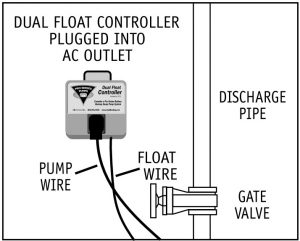
Plug the control box into a properly grounded, 3-prong receptacle, then insert the pump plug into the receptacle on the control box.For a neater installation, secure the power cord and the float switch cord to the discharge pipe with wire ties or hose clamps. Keep the cords separated from each other on opposite sides of the pipe.
Enhanced Controller
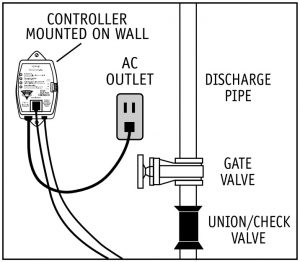
- Mount the controller to the wall through the 2 holes on the cabinet using proper mounting hardware for the application. The controller should be mounted at least 4’ from the floor and 1’ from the outlet.
- Check to ensure the float switch is connected to the controller. The float switch wire of the Enhanced Controller includes a connector that can be separated from the controller when the wire needs to be threaded through small openings. When used with the Enhanced Controller, the dual float switch has a safety locking pin. This pin will prevent the float switch from accidently being disconnected from the controller. Check to ensure the safety locking pin is inserted through the connector.
- Plug the control box into a properly grounded, 3-prong receptacle. Then, plug the pump into the receptacle on the control box. Do not use an extension cord.
- Using a flathead screwdriver, adjust the dial on the front of the controller to select the number of seconds that the pump will run after the float drops. The dial can be adjusted from 5-45 seconds. The manufacturer default is about 10 seconds.
Deluxe Controller
- Mount the controller to the wall through the 2 holes on the cabinet using the proper mounting hardware for the application. The controller should be mounted at least 4’ from the floor and within 2’ of the outlet.
- Check to ensure the float switch is connected to the controller. The float switch wire of the Deluxe Controller includes a connector that can be separated from the controller when the wire needs to be threaded through small openings. When used with the Deluxe Controller, the dual float switch has a safety locking pin. This pin will prevent the float switch from accidently being disconnected from the controller. Check to ensure the safety locking pin is inserted through the connector.
- Open the plastic door on the top of the Deluxe Controller and using a flat headscrewdriver adjust the dial to select the number of seconds that the pump will run after the float drops. The timer can be adjusted from 5-45 seconds. The manufacturer default is about 10 seconds. Install a 9V alkaline battery and replace the plastic door.
- Plug the control box into a properly grounded, 3-prong receptacle. Then, plug the pump into the receptacle on the control box. Do not use an extension cord.
- Make sure the Power Failure Alarm slide switch is in the ON position.
Connecting to a Security System (Deluxe Controller Only)The Deluxe Controller includes a terminal on the right side of the control box to connect to a security system or other alarm devices. There are (3) three positions for wire connections on this terminal: N.O. – normally open, N.C. – normally closed, and Common.
- Check your security system to determine whether an open (no contact) or closed (making contact) connection is needed to activate the alarm.
- The security system will provide (2) two connection terminals to extend wires to the control terminal. Strip two wires 1/4” each. Connect either wire to the common terminal. To secure the wire into the terminal, insert the exposed wire into the hole on the side of the terminal next to the screw marked common. Turn the screw a few turns to lock-in the wire.
- If the security system requires a closing of a contact to activate the alarm, securethe other wire into the terminal hole labeled N.O. (normally open). If the security system requires an opening of a contact, secure the wire into the terminal hole labeled N.C. (normally closed).
Connecting the Pump and Float Switch (Models VS and TS – No Controller)
- Plug the float switch cord into a properly grounded 3-prong receptacle. Then, plug the pump into the receptacle on the float switch cord. Do not use an extension cord.
Completing the Installation (all models)
- After the initial installation, be sure to check the pump operation by filling the sump with water and observing the pump through several full cycles. When using the Enhanced or Deluxe Controllers, the pump should run for 10 seconds after the lower float drops. Note: When the pump activates, it should have a “normal pumping” sound. Any abnormal sound, vibration, or lack of output is the signal of a problem. Stop the pump and refer to the troubleshooting guide. The vertical and tether floatswitch must be moving freely at all times. Make sure the float switch does not come into contact with other pumps, wires, pipe or any other object that may be in the sump pit. The float switch must not come into contact with the sump pit floor or wall. If the float switch does not move freely the pump will not activate.
- Replace the pit cover making sure not to pinch or crimp the pump wire with thecover. The pit cover either has a ‘hole punch’ that will allow the cord to be passed through or one can be drilled in the cover.
Product Operation
Dual Float Switch
The dual float switch contains two large floating rings enclosed within a protective cage. Water will lift the bottom float by a 1⁄4”, which will activate the pump. If for any reason the lower float does not activate the pump, the water will rise and activate the second switch. As the pump evacuates the water from the pit the floats will drop. The pump will run for an additional 10 seconds to extend the cycle after the lower float drops. When using the Dual Float Switch with the Enhanced or Deluxe controller, the float switch wire will include a connector that can be separated from the controller when the wire needs to be threaded through small openings. The float switch connector has a safety locking pin. This pin will prevent the float switch from accidentally being disconnected from the controller. To remove the pin, push the pointed end of the pin into the float connector and pull it out from the other end. The float switch wire can now be disconnected. Make sure to reinstall the pin after the float switch is reconnected.Note: When mounting the float switch, position the bottom of the cage at the height you want the pump to activate.
Vertical Float Switch with Enhanced or Deluxe Controllers
The vertical float switch contains a single large float. Water will lift the float by a 1⁄2”, which will activate the pump. As the pump evacuates the water from the pit, the float will drop. The pump will run for an additional 10 seconds to evacuate the pit completely after the float drops. Note: There are two rubber stoppers on the float switch rod. Do not remove or alter their position as it will disrupt the timing of the controller and how long the pump runs. Note: When mounting the float switch, position the bottom of the float at the height you want the pump to activate.
Tether Float Switch with Enhanced or Deluxe Controllers
The tether float contains a single float connected to a flexible tether. Water will raisethe float to activate the pump. As the pump evacuates the water from the pit the float will fall and the pump will run for an additional ten seconds to empty the pit. Note: The tether float switch must be moving freely at all times. If the float switch does not move freely the pump will not activate.
Dual Float Controller
The Dual Float Controller will activate the pump when either float is lifted, and thenshuts off automatically 10 seconds after the float drops. Plug the pump cord into the piggyback switch on the control unit.
Enhanced Controller
The Enhanced Controller features a dial to adjust the number of seconds that the pump will run after the float drops. The dial can be adjusted from 5-45 seconds. Themanufacturer default is about 10 seconds. The LED on the front of controller will signal the unit is receiving power. The controller will also run the pump once a week for approximately four (4) seconds. This test will exercise the pump and help ensure the pump is working properly.
Deluxe Controller
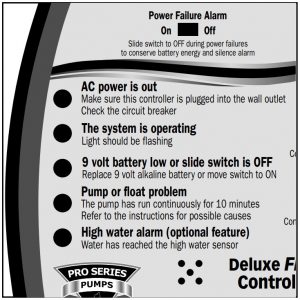
The Deluxe Controller features a series of warnings (audible and visual) that pinpoint potential problems with the pump, switch and power conditions. The controller will sound an alarm when power has been interrupted, whe the pump has run for more than 10 minutes continuously, or when the 9V battery is low. The 9V battery (sold separately) runs the controller during a power outage, allowing it to sound an alarm if the circuit breaker trips, the controller is not plugged in securely, or the home’s power is interrupted. Note: The 9V battery will only power the controller, not the pump. The Deluxe Controller is equipped with a USB data port. The purpose of this port is to allow communication with the Pro Series Connect Modules. The Pro Series Connect Modules are separately sold accessories that will allow the user to stay connected and receive remote notifications of potential problems and needed maintenance while away from home. The Deluxe Controller has a dial (located in the battery compartment) to adjust the number of seconds that the pump will run after the float drops. The Deluxe Controller will also run the pump once a week for approximately four (4) seconds. This test will exercise the pump and help ensure the pump is working properly.
Operating the Pump in a Continuous Duty Application
The ST Series pump is rated for continuous duty and may be used in applicationsrequiring continuous pumping including fountains or ponds. For use in any continuous duty application the pump should be plugged directly into the wall outlet without the use of the controller. The outlet must be a single phase properly grounded 3-prong receptacle, 115V, 60HZ. For continuous duty operation, the pump must be submerged at least 3/4 of the depth of the pump at all times.
Understanding the Warnings & Alarms – Deluxe Controllers
AC power is out
There are several causes for power failure. The most common causes are a power outage by the electric company or a tripped circuit breaker. Although the deluxe controller can not run the pump, it will sound an alarm indicating the loss of power. This will allow the homeowner to address the problem.
If this warning light and alarm are on, the control box is not receiving AC power for one of many reasons:
- The control box is not plugged in
- The power to the house is out
- The circuit breaker to that outlet has been tripped
- The ground fault interrupter on that outlet has been tripped
- A power brownout is taking place
Power Failure Alarm slide switch
When the controller is not receiving AC power, the monitoring features and the audible alarms are powered by the 9-volt battery. This type of battery will power the controller for many hours, but not indefinitely. Once the source of the AC power alarm is determined, it is suggested that the Power Failure Alarm slide switch be turned to the OFF position until the power is restored. This will preserve the battery and silence the alarm. When AC power is restored, slide this switch back to the ON position. Note: If the AC power is restored and the slide switch is in the OFF position, the alarm and light for the 9-volt battery warning will activate, even if the battery is good. This is a reminder to reset the alarm. Slide the switch to the ON position. If the battery is good, the light will go out. If the alarm continues to sound, replace the battery.
The system is operating
This light should be ON and flashing at all times. It is included to indicate that thesystem is monitoring the sump conditions. This light will not illuminate when:
- The power is out and the Power Failure Alarm slide switch is in the OFF position
- The power is out and the 9V battery is discharged
- The controller is not functioning. Contact the Glentronics service department.
The 9-volt battery low or slide switch is OFF
- The 9-volt battery located in the top of the control box is coming to the end of its useful life. Replace it with a new 9-volt alkaline battery.
- The Power Failure Alarm switch is in the OFF position. It must be in the ON position at all times, except when silencing an actual power failure condition.
Pump or float problem
This key feature monitors the time that the float switch is up continuously or in the activated position. It is unusual for a pump run for 10 or more minutes continuously.This can occur for many different reasons. Either the float is stuck in the up position, there is a mechanical problem with the pump, or there is a problem with the plumbing connections. Please refer to the Troubleshooting Guide on page 5.
High water alarm (optional feature*)
When water reaches the optional water sensor, it will activate the warning light, audible alarm, and remote terminal. The activation of the water sensor could indicate that there is a failure of the main pump or plumbing problem. Please refer to the Troubleshooting Guide on page 5.
- This feature requires the additional purchase of the water sensor (Model PS-WS).
Accessories for the Deluxe Controller – Connect Modules and High Water Alarm
Connect Modules – WiFi Module – Home Automation Module
(Requires purchase of PS-WiFi or PS-HZM)
The Deluxe Controller is equipped with a USB data port. The purpose of this port is to allow communication with the Pro Series Connect Modules. The Pro Series Connect Modules are separately sold accessories that will allow the user to stay connected and receive remote notifications of potential problems and needed maintenance while away from home.
High Water Alarm – Accessory for the Deluxe Controller
(Requires the additional purchase of Model PS-WS)
Water Sensor
The water sensor is designed to warn you of a potential flood. If you are installing it in the sump pit, it must to be installed between the basement floor and the primary float switch. If there is a failure with either the main pump or the plumbing system, the water level will rise past the primary float switch and activate the water sensor. When the water sensor is activated, it will trigger a warning light, an audible alarm, and the remote terminal on the controller. This water sensor is only designed to give you a warning of a potential problem; it will not activate the primary pump.
Maintenance Check List
Maintenance should be performed 1-2 times per year.
- Remove all debris from the bottom of the pit and make sure the pump’s strainer is clear of debris.
- Remove all debris floating in the water.
- Remove all debris from the float switch and float switch cage.
- Fill the pit with water. Make sure pump turns on at the intended level.
- While the pump is running, make sure pump is evacuating water at a good pace.
- While the pump is running, make sure a stream of water is escaping from the air bleed hole. If not, clear the hole of any deposits or debris.
Backup Installation
When the power goes out, the Pro Series AC sump pump will not operate. For protection during a power outage, a Pro Series battery backup system should be installed.There are three systems with matching batteries that will provide protection. Theillustration at right is an example of a typical battery backup installation.
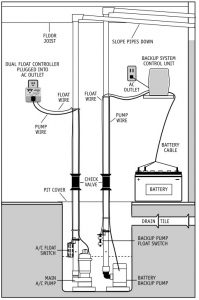
Visit our websitewww.stopflooding.com for more information about the Pro Series AC sump pumps and battery backup sump pump products.
Troubleshooting Guide
(Always unplug the pump from the controller before performing any maintenance)
| Problem | Potential Cause | Solutions |
| The pump will not start or run | Pump is not plugged in | Plug pump in properly (see instructions) |
| The float switch is not connected to the controller | Check connection of the float switch to the controller | |
| Water is not high enough to activate the pump | Make sure float switch is positioned property | |
| Open circuit | Check circuit breaker or fuse | |
| Poor power source | Check circuit line wires and cable* | |
| Low voltage | Check line wires and source voltage* | |
| Bad power cable | Replace with new cable’ | |
| Locked impeller | Remove strainer and clear obstruction | |
| Defective float switch | Replace float switch with new float switch | |
| Defective pump | Replace pump with new pump | |
| Thermal protector tripping or not functioning | Locked impeller | Remove strainer and clear obstruction |
| Incorrect power supply | Check power supply source and voltage | |
| Overburdened due to heavy sand content in the water | Use water filter or replace with a higher wattage pump | |
| Pump running continuously with no water present | Check float switch | |
| Pump starts and stops too frequently | Float switch or sensor is mounted too low | Raise float switch or adjust timer (Enhanced or Deluxe Controller) |
| Water flowing back from pipe | Install or replace check valve | |
| Malfunctioning float switch | Replace float switch with new float switch | |
| Pump will not shut off | Clogged or frozen discharge | Clear blockage or thaw frozen line |
| Blocked intake strainer | Clear debris from intake strainer | |
| One or both of the floats is obstructed and cannot drop down | Clear debris from inside the float cage (Loosen nut on top of float, then remove c-clip on bottom of float. Remove debris. Tighten nut on top of float, then replace c-clip on bottom of float.) When reassembling the float, the magnetic strip on the inside of the float should be facing down. | |
| Defective float switch | Replace float switch with new float switch | |
| Check valve installed with no air bleed hole in pipe or pump | Drill a bleed hole in the discharge pipe, or clean debris from the existing hole in the pipe or pump | |
| Check valve is stuck or installed upside down | Reverse or replace check valve. Make sure the check valve is installed withthe flow arrow pointing up and out of the pit. | |
| Insufficient or no water volume | Check valve on secondary pump will not close and water re-circulates within the system | Replace the check valve on the secondary pump |
| Worn impeller | Replace impeller & adjust spacing between impeller and cover | |
| Partially blocked impeller | Remove strainer and clear obstruction | |
| Clogged or frozen discharge | Clear blockage or thaw frozen line | |
| Broken or leaking pipe | Repair piping | |
| Low power voltage | Check power voltage, wires and cable condition | |
| Check valve installed with no air bleed hole in pipe or pump | Drill a bleed hole in the discharge pipe, or clean debris from the existing hole in the pipe or pump | |
| Check valve is stuck or installed upside down | Reverse or replace the check valve. Be sure check valve is installed withflow arrow pointing up and out of the pit. | |
| Pump is air locked | Remove debris from the air bleed hole | |
| Abnormal sound or vibration | Check valve on secondary pump will not close and water re-circulates within the system | Replace the check valve on the secondary pump |
| Blocked intake screen | Clear debris from intake screen | |
| Broken impeller | Replace impeller with new one |
*Consult a licensed electrician.If the above solutions do not solve the problem, contact Glentronics customer service 800-991-0466.
Limited Warranty
By opening this package and using this GLENTRONICS, INC. product, you are agreeing to be bound by the terms of the GLENTRONICS, INC. limited warranty (“warranty”) as set out below. Do not use your product until you have read the terms of the warranty. If you do not agree to the terms of the warranty, do not use the product and return it within the return period stated on your purchase receipt from the retail store or authorized distributor where you purchased it for a refund.
To the extent permitted by law, this warranty and the remedies set forth are exclusive and in lieu of all other warranties, remedies and conditions, whether oral, written, statutory, express or implied. GLENTRONICS, INC. disclaims all statutory and implied warranties, including without limitation, warranties of merchantability and fitness for a particular purpose and warranties against hidden or latent defects, to the extent permitted by law. GLENTRONICS, INC. will not be liable for any incidental, special or consequential damages for breach of any express or implied warranties on this product. In so far as such warranties cannot be disclaimed, GLENTRONICS, INC. limits the duration and remedies of such warranties to the duration of this express warranty and, AT GLENTRONICS, INC.’s option, the repair or replacement services described below. Some states (countries and provinces) do not allow limitations on how long an implied warranty (or condition) may last, so the limitation described above may not apply to you.
Any and all causes of action arising from, filed as a result of or in reference to, this warranty or the products described under this warranty shall be governed by and construed under the laws of the State of Illinois. Any cause of action arising from, filed as a result of or in reference to, this warranty or the products described under this warranty shall be filed only in the Circuit Court of the 18th Judicial District, Lake County, Waukegan, Illinois, or in the Northern District of Illinois if filed in Federal Court. The maximum liability for any product described in this warranty shall be the cost of product replacement only.
If any term is held to be illegal or unenforceable, the legality or enforceability of the remaining terms shall not be affected or impaired.
What is Covered by this Warranty?
GLENTRONICS, INC. warrants to the end purchaser that its pumps, switch and control unit products are free from defective materials and workmanship for the periods indicated below:
All parts and labor (excluding installation) for a period of:
- 3 years from the date of installation when purchased and installed by a contractor and when used intermittently as a sump pump, otherwise 18 months
- 1 year from the date of installation when used in continuous duty operations such as fountains or ponds
The defective product must be returned directly to the factory, postage prepaid with the original bill of sale or receipt to the address listed below. GLENTRONICS, INC., at its option, will either repair or replace the product and return it postage prepaid.
What is NOT Covered by this Warranty?
This warranty does not cover the cost or value of damaged property, including expressly any property that has been affected by water overflow, seepage or flooding. If GLENTRONICS, INC. determines that a product is deemed defective under this warranty agreement, it will repair or replace the PRODUCT ONLY. GLENTRONICS, INC. will not cover the cost to reinstall the product, nor will GLENTRONICS, INC. pay the cost of having a plumber or contractor repair or replace the product.
GLENTRONICS, INC. will not repair or replace a product that was installed incorrectly. A product shall be considered “installed incorrectly” when it deviates in any way from the instructions described in this manual.
This warranty does not cover product problems resulting from handling liquids hotter than 104 degrees Fahrenheit, handling inflammable liquids, solvents, strong chemicals or severe abrasive solutions; user abuse; misuse, neglect, improper maintenance, commercial or industrial use; improper connection or installation, damages caused by lightning strikes; excessive surges in AC line voltage; water damage to the controller; other acts of nature, or failure to operate in accordance with the enclosed written instructions.
How to Obtain Warranty Service
Within thirty (30) days of the product’s defective performance, the unit must be shipped, freight prepaid, or delivered to GLENTRONICS, INC. to provide the services described hereunder in either its original carton and inserts, or a similar package affording an equal degree of protection. Products not received by GLENTRONICS, INC. at the address indicated below within thirty (30) days of the product’s defective performance will not be considered for warranty service. Products received after the above mentioned timeframe fall outside of the timeframe for warranty service and will not be eligible for warranty service. The product must be returned to GLENTRONICS, INC. for inspection in order to be considered for warranty service. If the product is not returned to GLENTRONICS, INC. or the product is inspected by any person, plumber, contractor or business other than GLENTRONICS, INC., this warranty shall no longer be valid. Prior to defective operation, the unit must not have been previously altered, repaired or serviced by anyone other than GLENTRONICS, INC., or its agent; the serial number on the unit must not have been altered or removed; the unit must not have been subject to accident, misuse, abuse or operated contrary to the instructions contained in the accompanying manual. The dealer’s dated bill of sale, or installer’s invoice must be retained as evidence of the date of purchase and to establish warranty eligibility.
Where are Products Sent for Warranty Service?
Glentronics, Inc., 645 Heathrow Drive, Lincolnshire, IL 60069
How Can I Obtain More Information?
By calling 800-991-0466.

References
[xyz-ips snippet=”download-snippet”]

